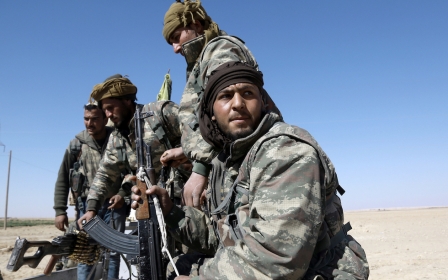US-led coalition airdrops shock troops into Raqqa province

The US coalition on Wednesday airdropped hundreds of Syrian Kurd-led allied fighters into areas around Raqqa, in a shock attack to cut Islamic State supply lines launched as western leaders discussed a new strategy against the group in Washington.
The Syrian Democratic Forces said its men had been parachuted into Tabqa in Raqqa province, across the Euphrates from the SDF's other main holdings, to seize villages from IS and curb Syrian government advances in that direction.
Centcom, the US command centre in charge of Middle East operations, would not confirm to Middle East Eye reports that US commandos were among the force dropped into Tabqa.
"The Coalition conducted an air movement of our Syrian Defense Forces and Syrian Arab Coalition partners to liberate Tabqa dam," Major Josh Jacques told Middle East Eye, referring to the US-led coalition which is fighting the Islamic State in Syria and Iraq.
The SDF said the operation was aimed at capturing the Tabqa area, west of Raqqa, and to halt Syrian government advances, the US-backed alliance of militias said in a statement on a social media feed.
Recently, the US increased its presence on the ground in Syria, with about 400 marines arriving to support the battle to unseat IS from Raqqa.
There are now nearly 1,000 US military personnel on the ground in Syria.
Earlier on Wednesday, a Pentagon spokesperson said that the US-led coalition would investigate reports that one of its air strikes on Tuesday killed 33 civilians in Raqqa.
The foreign ministers of 68 countries were meeting on Wednesday in Washington to discuss the campaign to defeat IS, the first time since Iraqi and US-led international forces took east Mosul, in Iraq, from the group.
US Secretary of State Rex Tillerson said the US would increase pressure on IS and al-Qaeda and work to set up "interim zones of stability" to help refugees return home in the next phase of the battle to defeat the groups.
Addressing top officials from an international coalition of 68 nations battling Islamic State in Iraq and Syria, Tillerson did not elaborate on where the US planned to set up these safety zones.
"The United States will increase our pressure on ISIS and al-Qaeda and will work to establish interim zones of stability, through ceasefires, to allow refugees to return home," he told the meeting at the State Department.
Stay informed with MEE's newsletters
Sign up to get the latest alerts, insights and analysis, starting with Turkey Unpacked
Middle East Eye delivers independent and unrivalled coverage and analysis of the Middle East, North Africa and beyond. To learn more about republishing this content and the associated fees, please fill out this form. More about MEE can be found here.





